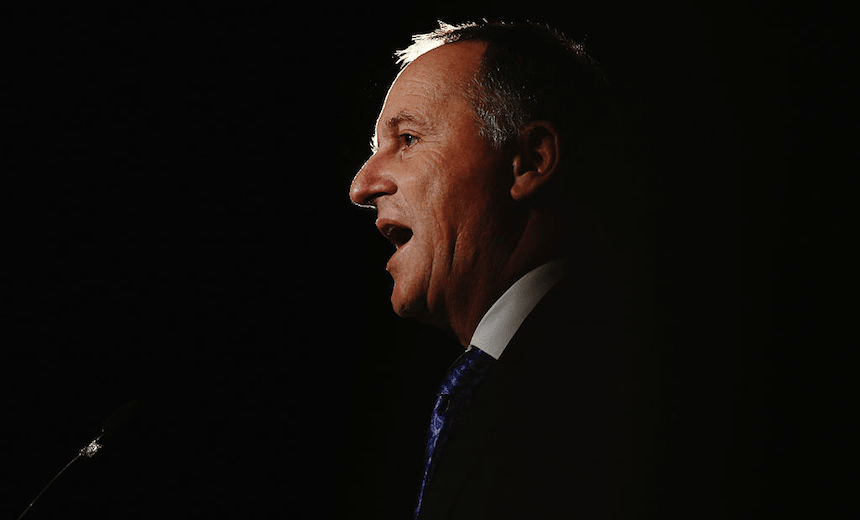This morning, John Key conceded some of his loudest and most persistent critics are right – about one thing at least. Tim Murphy was there to watch the Prime Minister change tack.
John Key this morning conceded the government is not spending enough on the nation’s most vulnerable.
In the midst of a political winter dominated by homelessness and inequality, it is quite some concession. His comments came at a fundraising breakfast on Auckland’s North Shore for De Paul House, a provider of emergency housing for families. During his speech he floated greater targeting to help vulnerable children earlier, using existing data to guide the government’s ‘investment approach’ to welfare spending. He even mentioned “to be blunt, profiling mechanisms” to help the targeting to change lives before problems become intractable.
His comments came at the sharpest of the sharp end of Auckland’s housing crisis – to a fundraising breakfast this morning for De Paul House, which has in the year to date provided 31 families up to 14 weeks of “transition” housing before finding them a stable home. It is 20 percent state funded, with the balance coming from private sources.
It was as sceptical an audience on housing policy as a National politician is likely to find, but Key confronted the homelessness issue head-on.
“There are many and varied reasons for it. The responsibility to try to resolve it has to rest with the Government, which has the resources of the public. I do not think we can shy away from that,” he said.
“This year we will spend about $10.4b on the most vulnerable New Zealanders. The question occurs: Is it enough? And the answer I think is ‘no’.”
It wasn’t an apologetic, mumbled no, either, but said with emphasis. He outlined three policies his administration is pursuing to remedy that:
* Disposing of housing assets in parts of New Zealand where demand is low (to community housing providers) and recycling that cash to acquire more properties in Auckland
* Extending income related rents, where tenants pay a maximum of 25% of their incomes on housing and the government pays the rest, beyond Housing New Zealand and to the new community housing providers
* Renewable tenancies, where instead of the ‘tenancy for life’ concept, ‘we ask people to move, respectfully and not too far away’ if they use one room of a 3 bedroom home. Key also raised the prospect of introducing rules for new ‘granny flats’ to be built on the back of Housing New Zealand sites so older tenants could stay while new families took the bigger home
He said Auckland’s housing issue needed “creative thinking”, and that all big centres – like London, Melbourne and Sydney – had similar issues. “We can’t do it on our own,” he said.
Non-governmental organisations (NGOs) often had far better contact and engagement with homeless people than Work and Income and people could feel more comfortable dealing with them, Key said.
He cited the Dunedin longitudinal study findings that the most vulnerable 20 percent of its cohort had the biggest instances of ACC claims, school absences, welfare receipts, incarceration and referrals to Child and Family.
“That 20 percent inevitably tied up a lot of resources and needs, for a variety of legitimate reasons.’
Using data to target spending early is one solution, he said. “Can we understand, to be blunt, through profiling mechanisms, how to do that? It will cost the Crown a lot more money up front but on top of that obviously deliver far better outcomes.’
“That’s the challenge in the modern world. You have to invest up front and get much better results later.”
In response to an audience question on finding cross-party support to help the vulnerable, Key said National and its opponents sometimes “just take a different view on things”. He used the review of CYFS as an example of the parties not seeing eye to eye.
“CYFS historical view is that a placement of a child should be with the family or extended family. Little Jimmy is 3, the mother can’t cope with the child, there’s a live-in boyfriend beating the kid and CYF take the child and give it to the old aunt, 75 and living in a far flung part of the country. Aunty might not be a position to deal with the child but that’s what CYF does.
“My personal view is and I agree with the report, it should be Child First. If a child goes to another family who are in a far better position to deal with the kid, that is better.”
Key toured De Paul House after the breakfast. They talk of a visit to the facility as being a “conversion experience” – but they’d already managed to get the Prime Minister to say, in public, that more needs to be spent and done.
And that was the elephant in the overcrowded car and bedroom…

